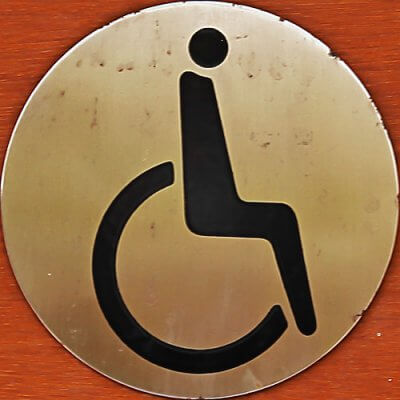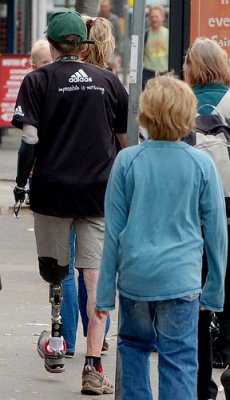Physical Disability and Mental Health – How Connected are They?

By: Mark Morgan
by Andrea M. Darcy
Has an injury or illness left you with a physical impairment? And have your moods been affected? Physical disability and mental health challenges often come hand in hand.
The unseen struggle
Physical impairment can lead to having to adjust so many practical things about your day-to-day life, that mental health doesn’t even make the list of concerns.
But according to the UK’s Mental Health Foundation, “of the over 15 million people in the UK who do live with a disability or physical health condition, more than 4 million have mental health issues”.
By the time you do realise there is an issue and you aren’t coping psychologically, you might feel there is nobody to turn to. You don’t want to ‘burden’ those you love who are already helping in other ways, or feel nobody will understand. Indeed loved ones might be part of the problem, in that they are pandering to you, or treating you as if you aren’t still you.
But it’s important, if any of the below mental health conditions sounds a bit too familiar, to seek support.
Physical disability and mental health
So just how does physical disability affect mental health?
1. Stress and anxiety.
 Many areas of your life can be affected, from simple daily tasks to things your career, or money. It can feel an endless set of things to worry about, which can cause overwhelm (stress) and negative thinking spirals about the future (anxiety).
Many areas of your life can be affected, from simple daily tasks to things your career, or money. It can feel an endless set of things to worry about, which can cause overwhelm (stress) and negative thinking spirals about the future (anxiety).
The Office for National Statistics in the UK (ONS) estimates that those with a physical disability have a 43% chance of anxiety, compared to the 27% chance of their non-disabled counterparts.
2. Depression.
If your negative thinking spirals are about yourself, and you simply can’t see a future ahead worth living? You are experiencing depression.
3. Grief and bereavement.
Have a deep sense of loss and can’t stop thinking of your life before? You might actually be going through the stages of grief, which include denial and anger.
4. Relationship problems.
Those around you have to adjust as well, which can not always go smoothly. There can be changes in roles and responsibilities. You might have worries about attracting future relationships, having a family, or about changes to your sex life.
5. Identity issues.

By: Adrian Brady
If you were always the one in charge, it can be extremely uncomfortable to suddenly have to ask for help or let others do things for you. Or you might have had your whole life planned, and now things are totally different. You might also experience low self-esteem.
It doesn’t help that you can feel others are imposing their view of what a disabled person is on you. Writer Lois Kieth, in her book Encounters With Strangers: Feminism and Disability, points out:
“Doing disability all day long can be an exhausting process. I don’t mean having an impairment, in my own case not being able to walk. Like most disabled people I can deal with this. I mean having to spend a significant part of each day dealing with a physical world which is historically designed to exclude me and, even more tiring, dealing with other people’s preconceptions and misconceptions about me.”
6. Post-traumatic stress disorder (PTSD).
Accidents and serious illness can leave you with PTSD, which can mean you are edgy, tense, on guard, and anxious.
7. Anger problems.
Just feel enraged that you must experience all this? Find yourself snapping at loved ones, or withdrawing from the world? Anger issues are common.
Of course anger can be a healthy response in the face of discrimination or being talked down to, or treated as if you are your disability, instead of someone with a disability.
8. Loneliness.
What you are going through is intense, and those around you might not be able to understand, which can lead to loneliness even when surrounded by loved ones.
The Office for National Statistics also reports that those who are disabled are almost four times more likely to report feeling lonely ‘often or always’ than non-disabled people, particularly in the 16 to 24 year old age group.
9. Substance abuse.
Stress can lead us to turn to things like alcohol and recreational drugs.
A study published in ‘Rehabilitation Psychology’ interviewed almost two thousand physically impaired Americans. It found a greater risk of substance disorders, particularly amongst men and men of Hispanic origin.
Can talk therapy help?
Yes. Therapy can of course help you manage anxiety, stress, and depression.
But therapy can also help you reframe your thinking, so that you can go from surviving to thriving. From seeing yourself as a problem, to seeing the opportunities you now have to be someone you hadn’t even considered before. And finding inner resources and parts of your personality you didn’t even know were there.
Having a disability does not, after all, mean you must be unhappy. In fact the same research by the Office of National Statistics that found higher possible rates of anxiety and loneliness in the physically disabled, didn’t find a huge discrepancy in reported happiness. While 77% of non-disabled interviewees reported feeling happy the day before, so did 65% of disabled people.
What sorts of counselling and psychotherapy help physical disability?
The National Institute for Health and Care Excellence (NICE) recognises the important link between physical disability and mental health and offer a guide to treatment.
Cognitive behavioural therapy (CBT) and behavioural couples therapy make their recommendations, along with group exercise classes tailored for your physical ability, peer support groups, and self help.
Other forms of therapy you might find helpful could include:
Existential therapy: It focuses on finding meaning and purpose, and helping you create a life based on values that are important to you.
Compassion-focused therapy: A form of therapy that promotes mental and emotional healing through being kinder to yourself and learning to understand others better.
Integrative therapy: your therapist will have training in several types of talk therapy, and can combine approaches and tools to best suit your needs.
Struggling to navigate life with a disability? And nobody to talk to? Harley Therapy connects you with top therapists in central London who work from our central London clinics or online. They are trained and experienced at understanding your issues. Alternatively, find an affordable, qualified UK therapist for online sessions at our sister site Harley Therapy Platform.




